Affiliate disclosure: This post may contain affiliate links. Please see our Privacy Policy.
Citrus curd is one of the few ways to safely can up eggs at home. There’s plenty of high acid citrus juice which means that it’s safe for water bath canning.
Canning lemon curd is specifically approved by the national center for food preservation. Canning lime curd works just as well, and they’re both perfect homemade gifts for the holidays.
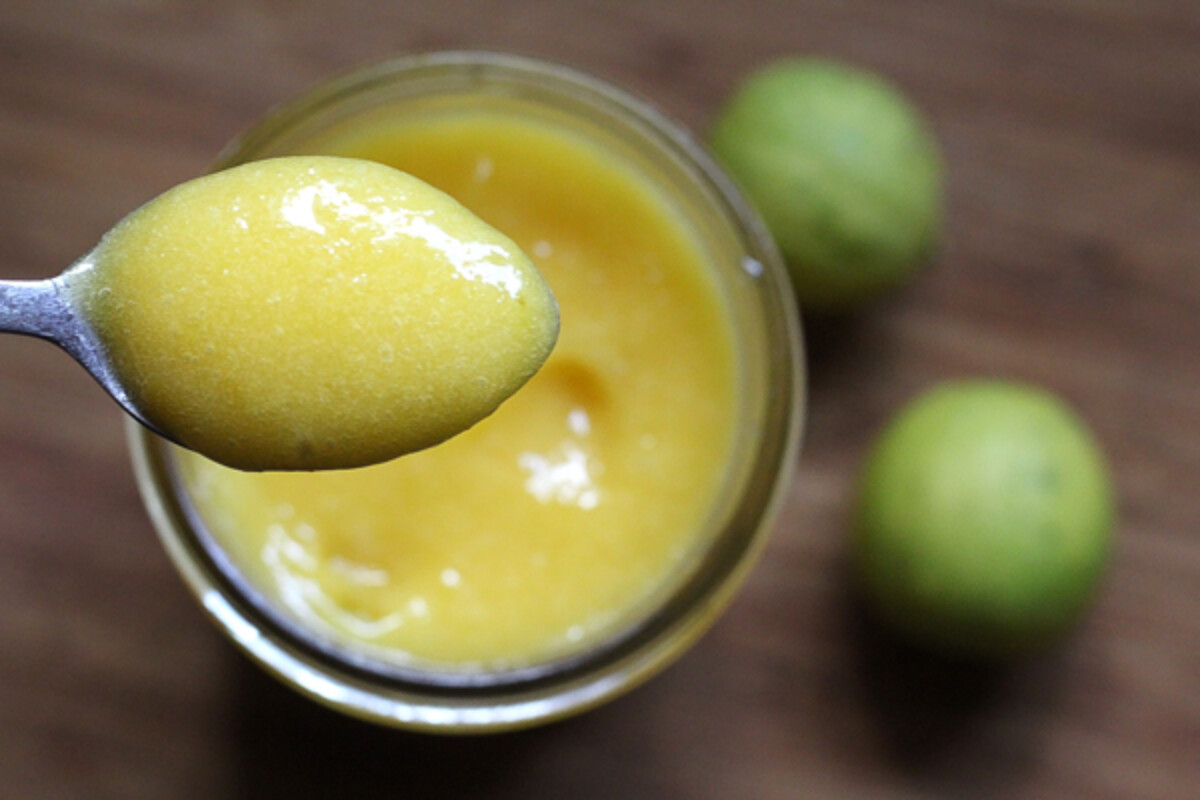
Living in Vermont really has its perks and I love it most of the year. Clearly, others do too, and just about every corner store seems to cater to tourists with cute gifts for passers-by wanting to take home a bit of the green mountain state.
I can all my own jams, but I still love perusing the cute gift shelves in coffee shops for ideas. A few weeks ago I spotted a jar of locally made lemon curd canned up and shelf-stable.
Wait just a minute…canning lemon curd? Really? That’s a thing? Lemon curd has both eggs and butter, and I thought both of those were on the no-fly list for home canning?
Apparently not, and once you think about it, it makes perfect sense. Lemon curd is wicked acidic, and you’re basically slowly pasteurizing the eggs as the mixture thickens. The whole thing is then essentially pickled in lemon juice, making it safe for water bath canning.
My husband is particularly fond of limes, and I came across a bag of key limes I decided to try it out. Fair warning though, lime curd isn’t as photogenic as lemon curd.
It doesn’t matter what citrus you use, the curd will still be yellow because of the egg yolks. As far as gifts are concerned, stick with lemon unless you know someone is a die-hard lime fan.

Start by bringing a water bath canner up to 180 degrees. Canning lemon curd is a bit different than most preserves which have you start with a boiling water bath canner. The citrus curd needs a slow buildup to boiling in the canning process, and this step cannot be skipped.
You’ll need a dependable thermometer that can read up to 180 degrees to ensure you’re starting at the right temperature. Get the water warm and then keep it there while you prepare the citrus curd.
Next start water heating in a double boiler. While that heats, take the top bowl from the double boiler and whisk together the egg yolks and whole eggs. Add in sugar and zest and whisk thoroughly before adding citrus juice and cold butter pieces.
Place the whole pan onto the simmering pot as a double boiler and cook slowly while continuously whisking. It won’t look like much at the start, but as the mixture heats it’ll begin to thicken nicely.
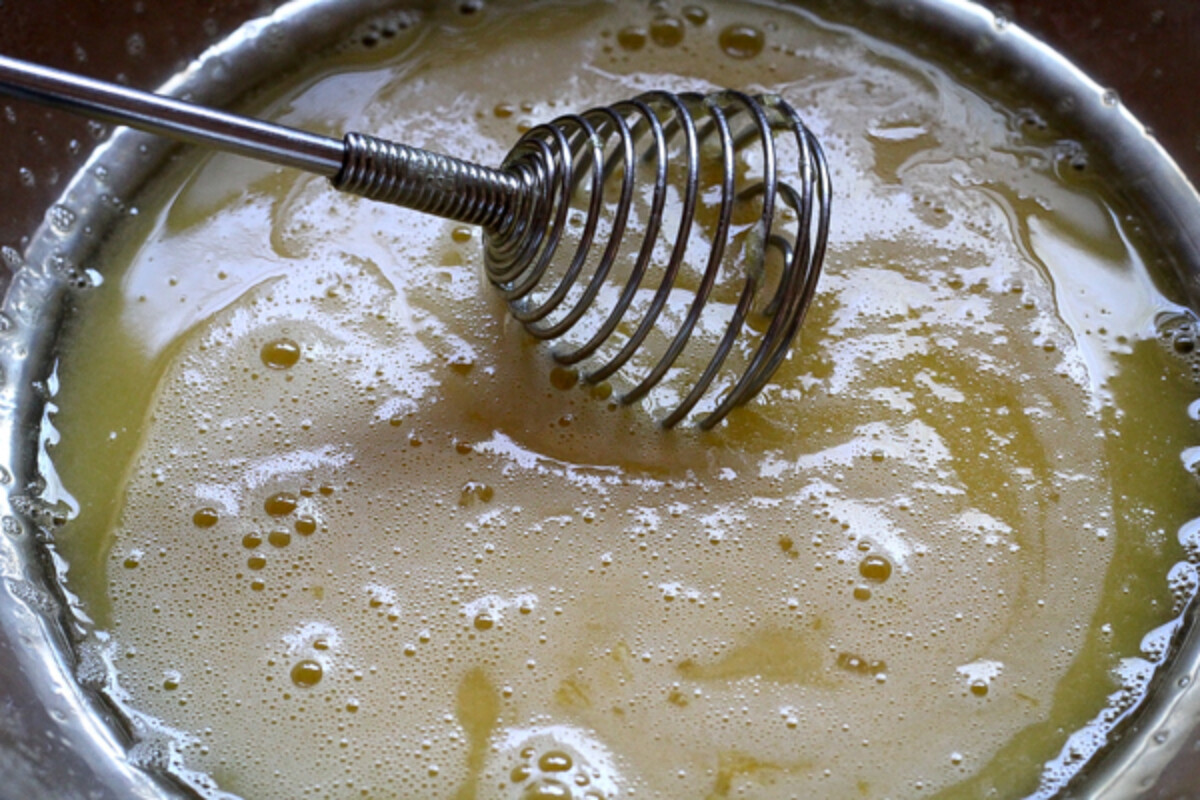
Whisk continuously over the double boiler until it reaches a temperature of 170 degrees. This is easy to measure with a digital thermometer, and you’ll need one anyway for ensuring the water is the right temperature for the canning process. Once it’s 170 degrees, remove the bowl from the double boiler and continue to stir for another 5 minutes while the mixture continues to thicken.
At this point, many people put the mixture through a fine-mesh strainer to remove any clumps and filter out the citrus zest. I never bother with this because I’ve never had any clumps in my mixture.
Just keep the heat low on the double boiler and keep whisking. If you do get clumps where the egg has cooked too quickly, make sure you filter it before canning.
At this point, it’s time to get the curd into prepared canning jars. Pour the mixture into clean half-pint jars leaving 1/2 inch headspace. This recipe is only approved for canning in half-pint jars.
Place the sealed jars in a water bath canner that’s been heated to 180 degrees. Turn up the heat and bring the water to a boil with the lemon curd jars inside the canner. It should take 25 to 30 minutes to bring the water to a boil, and this pre-heat time is important to the canning process.
Once the water starts to boil, that’s when you can start the final timer. Process the jars for 15 minutes with the water boiling (in addition to 25-30 minutes with the water not yet boiling).
Once the canning time has elapsed, turn off the canner and allow the jars to sit for 5 more minutes before removing them. This extra step helps prevent siphoning from the temperature shock as the jars are removed. It’s important to keep the jars clean and make sure they seal properly.
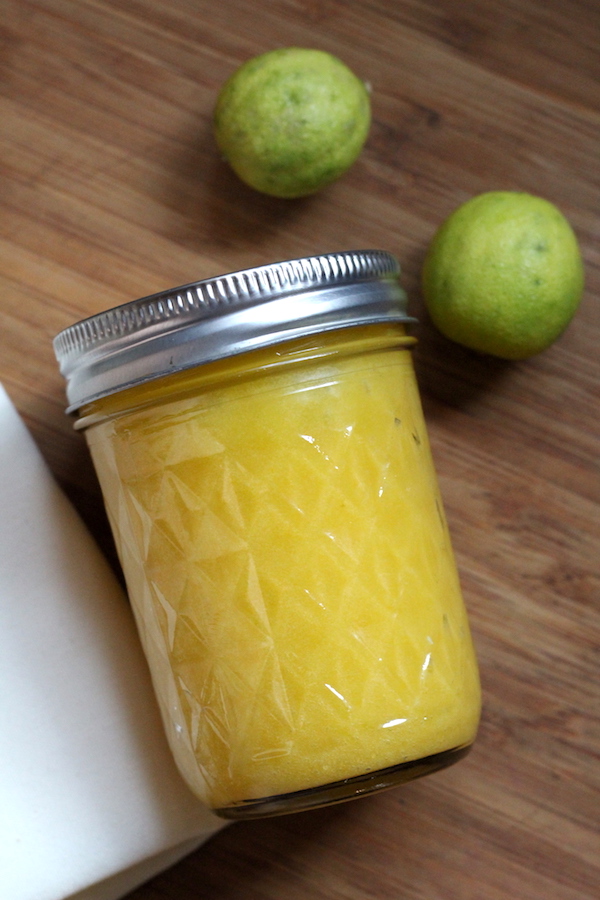
Remove the jars and allow them to cool to room temperature before checking seals. Store any unsealed jars in the refrigerator and use immediately, or freeze the lemon curd and it’ll keep for a year.
While jams and jellies store easily for 12-18 months without issue, lemon curd is a bit different. It’s best to use the sealed jars within 3-4 months because after that point they’ll start to separate and discolor.
Canning lemon curd allows you to preserve it long enough to give as an edible gift, but it won’t preserve it forever. Be sure the recipient knows not to lose the jar at the back of the pantry.
This recipe yields 3 or 4 half-pint jars. If your eggs are on the smaller side, you may be a bit short for the 4th jar, so put that one in the fridge for immediate use rather than canning.
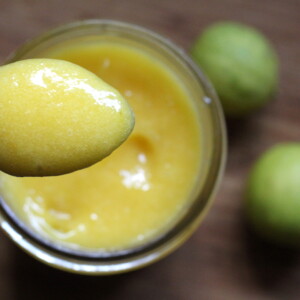
Canning Lemon Curd (or Lime Curd)
Ingredients
- 7 egg yolks
- 4 whole eggs
- 2 1/2 cups sugar, superfine works best
- 1/2 cup lemon zest, fresh not dried
- 1 cup lemon juice
- 3/4 cup butter, cold cut into chunks
Instructions
- Prepare a water bath canner and bring it to 180 degrees. Hold it at that temperature (not boiling) while you prepare the lemon curd for canning.
- Start water simmering in the bottom of a double boiler.
- In the top bowl of the double boiler, off the heat, whisk the egg yolks and whole eggs. Add in the sugar and zest and whisk thoroughly. Finally, add in the lemon juice and chunks of cold butter.
- Place the bowl on top of the double boiler and heat while whisking constantly. Once the mixture reaches 170 degrees, remove from heat and continue whisking for another 5 minutes while the mixture thickens.
- Pour the lemon curd into prepared half-pint canning jars, leaving 1/2 inch headspace. Center canning lids and seal to finger tight.
- Place the jars in the water bath canner and slowly bring it up from 180 degrees to boiling. This should take 25 to 30 minutes. Boil the mixture for 15 minutes and then turn off the heat. Leave the jars in the canner for 5 more minutes before removing them.
- Allow the jars to cool to room temperature before checking seals. Store any unsealed jars in the refrigerator or freezer. Sealed jars will keep for 3-4 months.
Notes
Nutrition
Nutrition information is automatically calculated, so should only be used as an approximation.
More Ways to Preserve Lemons?
Looking for more easy ways to preserve lemons? Read on…
- 20+ Ways to Preserve Lemons
- Canning Lemons (3 Ways)
- Lemon Wine
- Salt Preserved Lemons
- Natural Citrus Seed Pectin for Canning (From Lemon Seeds)
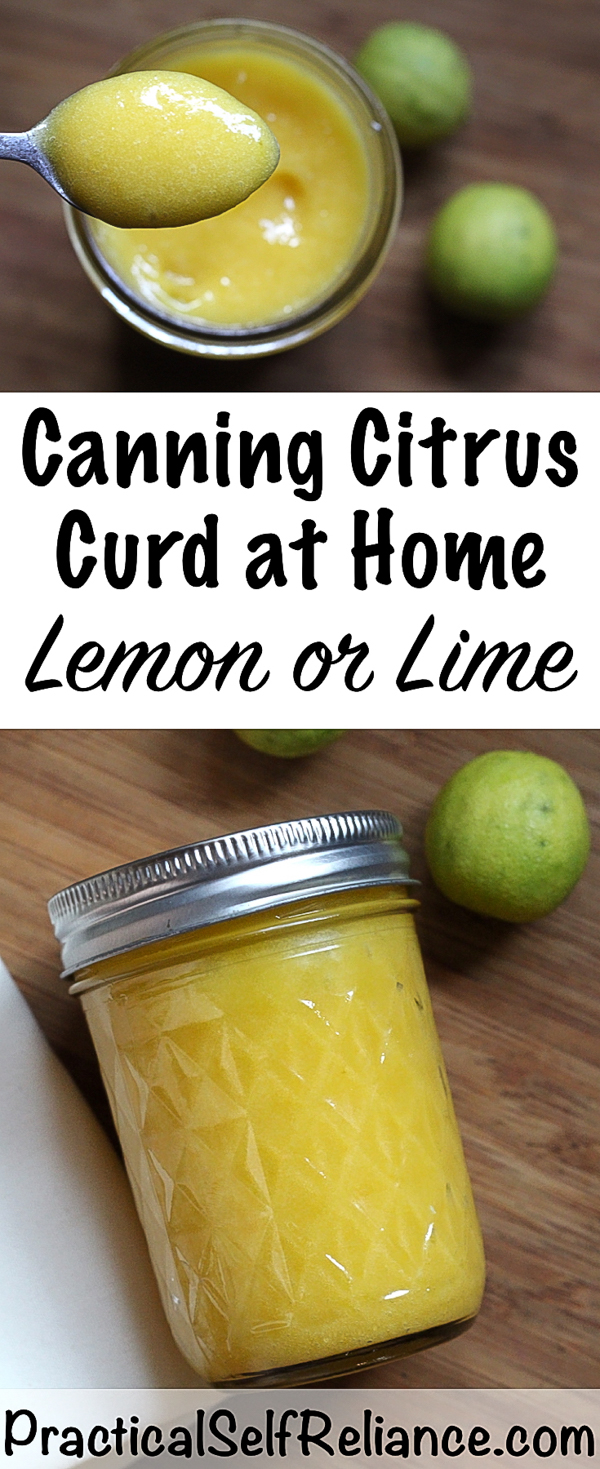
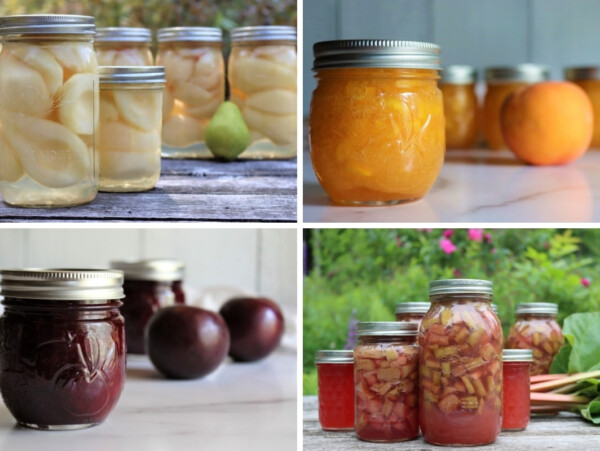
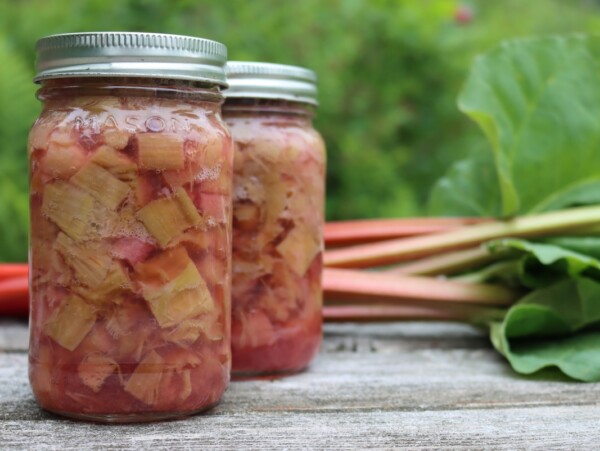
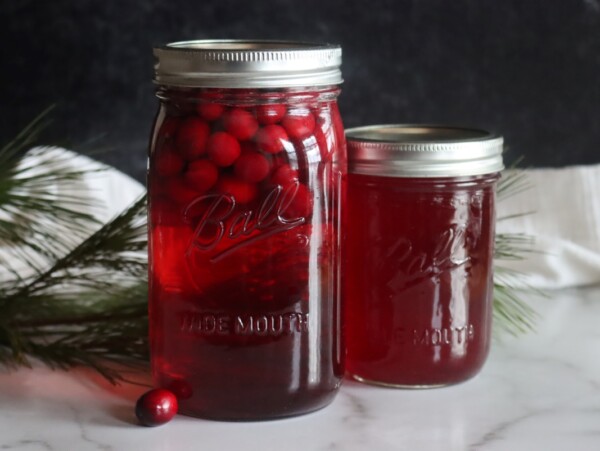
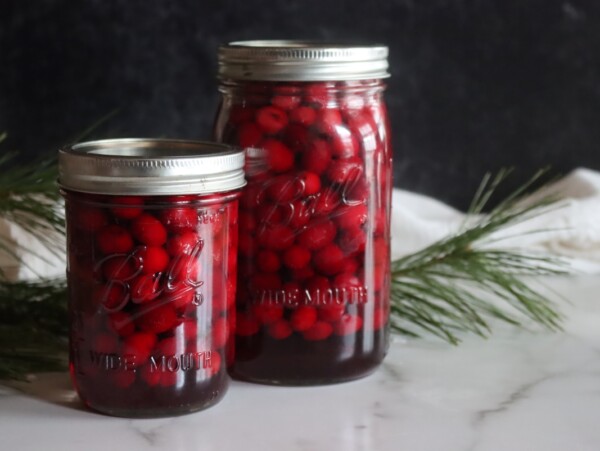





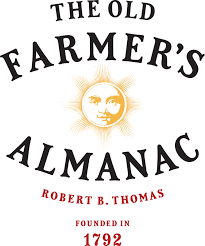




Made grapefruit curd and canned. It lost integrity in the jar after only a few months. Started to change color and texture but remained sealed.
This recipe is only tested for lemons and limes, which are much more acidic than grapefruits. I’m not sure if canning grapefruit curd is acidic enough to keep.
Made this with Myers’s lemons a few years ago. It was delicious and shelf life was as states. Today I am making it with lime. Can’t wait!! Thank you so much for all your wonderful recipes. You have been instrumental in my journey to self reliance. Thank you.🙏🏼🙏🏼🙏🏼
You’re very welcome. So glad it worked so well for you.
Why is the shelf time so short? My jams last a couple years.
Yes, jams do last a few years. The reason the shelf life is so short on this one is that there are still enzymatic processes happening inside the jar, and with the eggs, it just doesn’t last as long (quality wise). It’s not that it spoils or is unsafe to eat, it’s just that it separates and/or gets grainy, and starts to lose the intense lemon flavor. After a while, it just isn’t as tasty, but it’s still not “spoiled” if it’s properly canned. Does that make sense?
My homestead egg yolks are orange. My lemon curd was an orange colour as a result. No issue there…that was before I put it in the water bath. After I took it out the jars had changed to a very dark reddish brown. Any idea why this might happen. Haven’t tasted it yet, as I’m waiting for it to seal.
That’s very strange. Most egg yolks from free range chickens tend to be more orange but I haven’t heard of the lemon curd turning reddish brown like this.
How would this freeze Dry?
I haven’t personally tried it but I believe you can. Be sure to check back in with us and let us know how it turns out.
Hi!
Recipe look’s delish! I’ve had the curd in my double broiler for more than 30 mins and it still isn’t at 170 degrees! Should it be taking this long!! Water is boiling nicely! How.much.longer 😫
It should have gotten up to temp within that time, especially if the water was boiling. Did you ever get it up to temp?
Could I safely substitute honey for sugar in this recipe? Thank you!
I’m not sure that I would recommend it since it hasn’t been tested with honey.
If the Lemon Curd is good for 3 – 4 months on the shelf, once you open it and put it in the refrigerator how long is the refrigerated curd good for?
It won’t keep for long in the fridge. I am going to guess maybe a week or two.
Mine have lasted for about a month before color and texture starts to change. Still tasty. I don’t have a problem using it all before it spoils. So yummy.
Yeah, it’s usually not a problem. Thanks for sharing.
Do you use salted or unsalted butter in this recipe?
I would always assume unsalted unless the recipe specifies otherwise.
I am living at about 2300 feet elevation. In one of the comments, you said something about safety and being <1000 ft. Is the lemon curd safe for water bath canning at my elevation? Thank you!
I looked at the approved recipe from the National Center for Home Food Preservation and according to their chart, lemon curd can be water bath canned above 1,000 feet. For 1,001 to 6,000 feet you just need to increase the processing time from 15 minutes to 20 minutes. Here is the direct link if you would like to check it out. https://nchfp.uga.edu/how/can_02/lemon_curd.html
Is lemon curd sealed jars last 3-4 months at room temperature or in the fridge
As long as it is sealed, it will last 3 to 4 months at room temperature. Once opened, they need to be kept in the fridge or freezer.
Any thoughts about omitting the butter? I’m dairy free but really want to make some lemon curd and use up some of my eggs.
I have seen other recipes on the internet for lemon curd made without butter. I would suggest researching some recipes and then either keeping it in the fridge or making sure that you find an approved recipe for canning.
Thank you!
What do you use lemon curd for , when you open the jar ?? Sounds good.
It’s often used for fillings in desserts, as a topping or layered in parfaits. There are also many recipes out there that incorporate lemon curd. A quick internet search should give you lots of options.
Karen,
If your a true lemon fan you’ll find that you can eat it with a spoon str8 from the jar…if going forQuick and Fancy, try combining 2 jars of your curd with an 8oz container of Thawed Cool Whip for a Lemon Fluff…very refreshing, Enjoy
Would it be possible to use a replacement for sugar such as granulated Swerve?
That’s a good question, and I’m not sure the answer has been tested. In theory, I’d assume it’s fine, and this article seems to say that canning with swerve is totally fine: https://foodinjars.com/blog/canning-101-can-you-preserve-with-artificial-sweeteners/
That said, I honestly have no idea how switching out for swerve would impact the safety of the recipe.
If I was wanting to freeze the lemon curd then I do I still need to water bath it? It sounds like it is more stable in the freezer then the pantry and I need it to last about 6-8 months.
If you’re going to store it in the freezer, then you don’t need to water bath it. Know that it’s not shelf-stable, and it’ll need to be kept in the freezer until you need it (and then the refrigerator once defrosted/opened). Once opened and in the fridge, it’ll only keep a short time.
I made the lime curd and it was very good. I’m just wondering if you can cut back on the sugar?
You should be able to safely reduce the sugar in the recipe if you wish. The acidity in the recipe is what makes is safe to can.